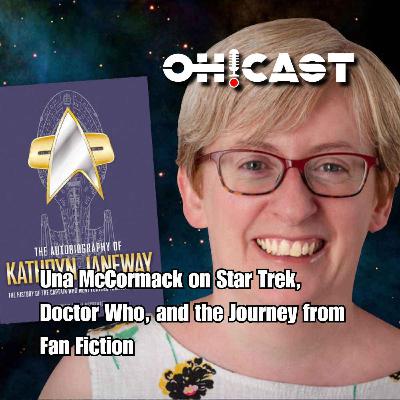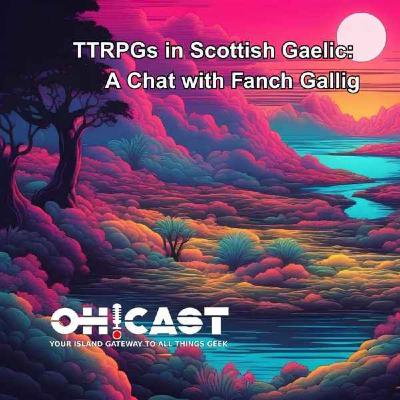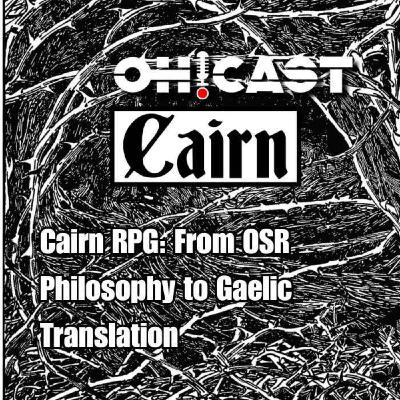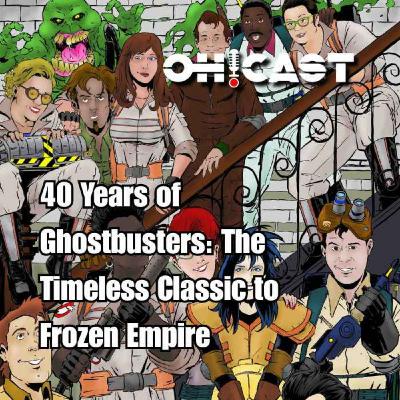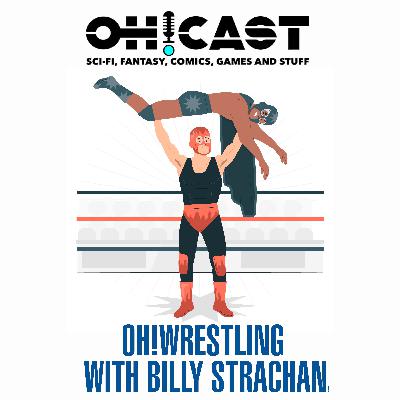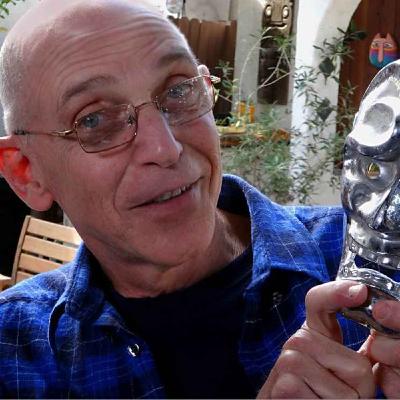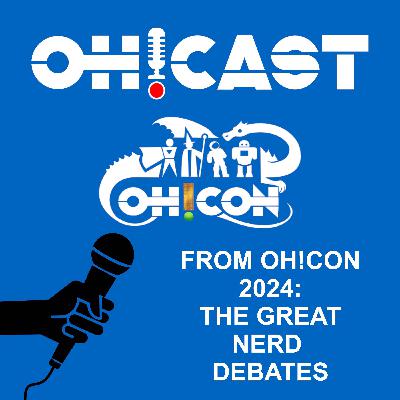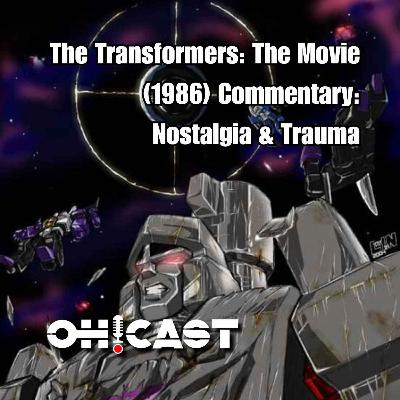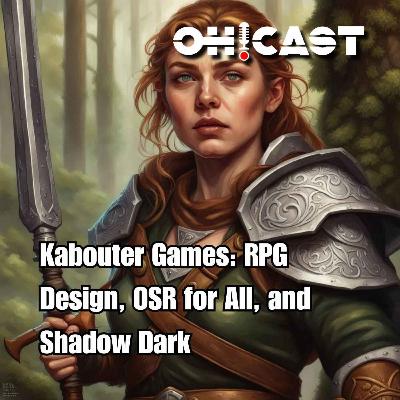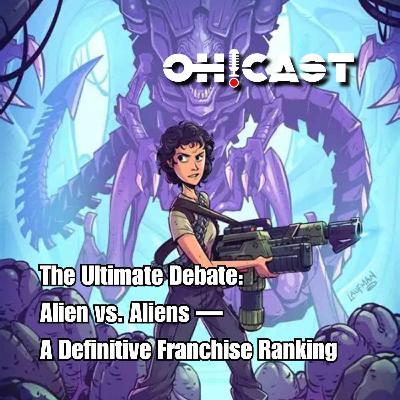Discover OH!CAST | Exploring Geek Culture, Fandom and Pop Culture
OH!CAST | Exploring Geek Culture, Fandom and Pop Culture

OH!CAST | Exploring Geek Culture, Fandom and Pop Culture
Author: OH!CAST: Geek Insights & Pop Culture
Subscribed: 0Played: 1Subscribe
Share
© OH!CAST
Description
Brought to you from the wild, wonderful Outer Hebrides, OH!CAST is a geek culture podcast where the Atlantic winds meet the winds of change in fandom, gaming, and all things nerdy.
Tune in for insights, laughs, and plenty of "oh!" moments.
Hosted by Cal MacDonald aka "DeepSpaceHebrides"
- Contact us: oh.con.podcast@gmail.com
Hosted on Acast. See acast.com/privacy for more information.
31 Episodes
Reverse
Welcome back to OH!CAST, where host Cal, Herward, and late-comer Graeme resurrect the fan-favorite segment: Roll for Persuasion Geek Debate! Cal welcomes back Herward (out of cryogenic sleep) to roll a D20 against 20 random geek topics. We jump straight into a high-stakes, hilarious debate where you'll hear controversial takes on Star Trek, James Bond, and some of the biggest TV shows of all time. This episode is a must-listen for anyone who loves arguing about pop culture.Best & Worst Openings in Film and TVThe D20 lands on a classic topic: Best and Worst Openings. The crew wastes no time tearing apart Star Trek: The Next Generation's pilot, "Encounter at Farpoint." They call the pilot a "45-minute script made into a two-hour pilot." Then, Herward throws a curveball by naming Roger Moore's For Your Eyes Only as a simultaneously brilliant and terrible opening. Specifically, he discusses the infamous pre-title sequence. This sequence—designed to kill off Blofeld without naming him—features Bond dropping him down an industrial chimney.Most Overrated TV Show of All TimeNext, the debate heats up with Most Overrated TV Show of All Time.LOST: Cal and Herward agree this show is dreadful. They criticize its "mystery box nonsense" which had "no payoff to any of the mysteries." Herward even jokes the ending reveals they "have been dead the whole time," making it a waste of time.Game of Thrones (GoT): Cal calls the series a "good, solid fantasy" but argues it couldn't live up to the exceptional hype. Herward agrees, but reserves his main criticism for the show's "absurdly horny" writers. He cites a sequence where Littlefinger is explaining a complicated plot while two women are engaged in a sexual act in the background. He calls this puerile and unnecessary filler.This segment perfectly showcases why the Roll for Persuasion Geek Debate feature is so beloved.Top Five Fictional VehiclesFinally, they roll for Top Five Fictional Vehicles:Ecto-1 (Ghostbusters).USS Defiant (Deep Space Nine): Cal names this ship, noting Ben Sisko designed it for one purpose: to take revenge on the Borg after they blew up his wife. He describes it as "a whole set of guns strapped to an engine."Gunstar (The Last Starfighter): Herward praises this computer-generated spaceship for its awesome look and the ultimate secret weapon, Death Blossom.Eagle Five (Spaceballs): The "camper van with wings" known for doing a handbrake turn in space.Red Dwarf (the ship itself): Named for its "shonky" BBC budget look that still managed to appear vast and mind-blowing at the time. Hosted on Acast. See acast.com/privacy for more information.
In this exciting episode, we sit down with the renowned sci-fi author Una McCormack. Known for her intricate storytelling, Una McCormack shares her journey as a writer. First, she talks about her early inspirations and how they shaped her career. Then, she dives into her latest projects, offering a rare glimpse into her creative mind.Listeners will be captivated by Una McCormack's insights into crafting compelling narratives. She explains the art of world-building and how it transports readers to otherworldly realms. Moreover, she discusses the challenges and rewards of writing in the sci-fi genre. Aspiring writers will find her advice invaluable.Throughout the interview, Una McCormack reflects on her experiences with iconic franchises like Star Trek and Doctor Who. She shares anecdotes from her collaborations, highlighting the community spirit in sci-fi. Additionally, she delves into recurring themes in her work, providing a deeper understanding of her creative process.This episode is a must-listen for fans of Una McCormack and sci-fi enthusiasts alike. Whether you're familiar with her work or new to her stories, you'll gain a fresh appreciation for her narratives. Her ability to weave intricate plots and develop rich characters is truly remarkable.As the conversation unfolds, Una McCormack teases her upcoming projects. She shares exciting new stories that promise to captivate audiences. Her enthusiasm for the genre is infectious, inspiring listeners to explore the limitless possibilities of sci-fi.Tune in to discover the secrets behind Una McCormack's success. Learn how she continues to push storytelling boundaries. This episode is not just an interview; it's an invitation to journey through the imaginative worlds of one of sci-fi's most talented authors. Don't miss this chance to hear from Una McCormack herself and gain valuable insights into the art of sci-fi writing. Hosted on Acast. See acast.com/privacy for more information.
Director James Ward Byrkit on the Cult Classic CoherenceWe welcome special guest and director James Ward Byrkit to OCAST. The James Ward Byrkit Coherence Film is the main focus of this conversation. We know him for his work as a creative consultant on Pirates of the Caribbean. Join us as he discusses the genesis of his low-budget 2013 sci-fi cult film, Coherence.Making Coherence: No Script, No Crew, Five NightsJim Byrkit reveals how he created Coherence with next to no resources. For instance, he shot the film entirely at his house over just five nights. He explains his unique, stripped-down filmmaking theory. Consequently, this process involved having no script, no crew, and relying entirely on actors improvising the dialogue. Byrkit also shares the frantic timeline for the shoot, which his wife's impending due date compressed.Quantum Physics, Improvisation, and Alternate RealitiesThe minimal-budget cosmic stories of The Twilight Zone inspired the idea for Coherence. He discusses the deep philosophical concepts at the heart of the movie, including quantum physics and the idea of decoherence. Furthermore, he talks about the complexity of editing the improvisational takes. James Ward Byrkit details how he managed eight powerful personalities without giving away the story's twists. We also analyze the film's fascinating use of alternate realities and the concept of Schrödinger's Cat in detail.Impossible Odds and Legacy of the FilmHear the unbelievable, freaky coincidence that occurred during the single night of exterior shooting. Byrkit had to film across the street from a gigantic Snickers commercial. He also shares the story of convincing the Screen Actors Guild that he was making a real film, despite having no crew, script, or schedule. Ultimately, the success of the Coherence Film showed that a micro-budget movie could reach a global audience. Hosted on Acast. See acast.com/privacy for more information.
The Last Perfect Trilogy? A Retrospective on 80s Sci-FiWe dedicate this episode to the enduring legacy of one of the most beloved movie series of all time: the Back to the Future Trilogy Retrospective. Join the hosts as they ask whether the Robert Zemeckis/Bob Gale creation remains the last "perfect trilogy." It has not been ruined by legacy sequels or unnecessary updates. Therefore, we celebrate the film's broad appeal. This appeal, for example, spawned sequels, a video game, comic books, and an official musical.The Flawless First Film: Script, Casting, and the ClockThe conversation begins with the original 1985 classic. Many fans, including the hosts, consider the script of the first movie "quote unquote perfect." Because it ties up every element so neatly, it feels flawless. We dive deep into the film’s necessity-driven details. This includes the iconic DeLorean, which originally was not the time machine. Furthermore, we also analyze the genius of the casting. Michael J. Fox's movement and energy created a radically different Marty McFly compared to the footage of original actor Eric Stoltz.Production Secrets: Time Machines and Ticking ClocksWe explore the secrets behind the film's production and its legendary tension. Learn about the two bizarre original ideas for the time machine's power source. The first was a refrigerator, and the second was Coca-Cola to appease a studio. We discuss the famous climax. This climax came from necessity. The production team couldn't afford the original plan to use a nuclear bomb test to power the DeLorean. Instead, Zemeckis and Gale replaced it with the masterpiece of tension that is the Clock Tower lightning strike. Consequently, this proves the old filmmaker adage: "To add tension in a scene, you add a ticking clock."The Sequels and Securing the LegacyThe Back to the Future Trilogy Retrospective concludes by examining the sequels. We look at Part II and Part III. Specifically, we discuss the incredible effects work, the fun of the 2015 future sequence, and the amazing transformation of Christopher Lloyd into the older Doc Brown. Finally, we praise Zemeckis and Gale's stipulation that there will be no remake or sequel during their lifetimes. This secures the trilogy's perfect, conclusive ending with the time-traveling steam train.Whether you're a lifelong fan of time travel movies or new to the series, this episode offers a rich exploration of the magic behind the Back to the Future trilogy. Tune in for an engaging conversation filled with laughter and cinematic mastery.Don't forget to subscribe to OH!CAST for new episodes every week:Spotify: https://open.spotify.com/show/7te8PUqsBFhfOiOT5AFg8HApple Podcasts: https://podcasts.apple.com/gb/podcast/oh-cast/id1767015786Contact Us: oh.con.podcast@gmail.com Hosted on Acast. See acast.com/privacy for more information.
Creating the Improvised Doctor Who Show and Twilight Zone Improv Hosts Cal, John, and Martin welcome James Gamblin and Lou Dunn to the show. James and Lou are the creators of the hit Edinburgh Fringe show, "Any Suggestions, Doctor?". This is an Improvised Doctor Who Show. The idea started over a pint. Eventually, it became a main feature at the Festival. The team discusses how they deliver a brand new Doctor Who adventure every single night. Furthermore, they base all of this on audience suggestions. We also touch upon their other successful project. This is a completely improvised Twilight Zone show. Therefore, they discuss the challenge of shifting between different sci-fi genres on the spot. Lo-Fi Sets and the Live Music Secret The Improvised Doctor Who Show deliberately embraces the low-fidelity charm of classic Doctor Who. James and Lou explain their technique. They use simple, generic props, such as blankets and cloths. Specifically, these stand in for giant monsters, alien terrain, and other complicated elements. This choice encourages the audience's imagination. Moreover, one of the show’s unique elements is the use of a live musician. This person scores the entire performance. They act as a secret director: by increasing the tempo and volume, they subtly signal to the improv performers. Consequently, the Doctor needs to solve the crisis and save the day immediately. It’s an innovative technique that adds genuine tension to the spontaneous narrative. Structuring the Story and Audience Navigation Lou and James detail the structure of the show. They use long form improv to tell an entire episode's story over a single hour. Therefore, they must follow the established beats of a traditional Doctor Who episode. This includes A, B, and sometimes C plots that must eventually converge.This Doctor Who Improv relies heavily on audience suggestions for the episode's title, setting, and companion characters. The hosts explain the delicate balance of navigating audience suggestions. These occasionally include sensitive or inappropriate topics. However, they still keep the performance successful, fun, and true to the spirit of the show. Additionally, we explore their hope of bringing the show to the Outer Hebrides. John even offers to provide a replica Dalek for their performance. This confirms the strong connection between fandom and improvisational comedy. The interview concludes by reflecting on the sheer joy and unpredictability of performing a different sci-fi universe every single evening. Hosted on Acast. See acast.com/privacy for more information.
The Breton Roots of Gaelic Fantasy TranslationHost Callum welcomes Fanch back to the podcast. Fanch, a Breton native, discusses his lifelong passion for fantasy and Celtic languages. He explains his Breton heritage. This heritage naturally connected him to the folklore of King Arthur and the Knights of the Round Table. In addition, this directly influenced his love for modern fantasy like Lord of the Rings and Star Wars. We focus on his work on Gaelic Fantasy Translation and language reclamation. Fanch, a self-proclaimed language nerd, also delves into his personal journey. For example, he learned multiple Celtic languages. These include Irish, Scottish Gaelic, and even the Doric dialect of Scots. This interest in linguistics leads to a fascinating discussion. They talk about T.R.R. Tolkien, a philologist. Indeed, he famously created his epic fantasy world only after first inventing the languages to populate it.The Cairn RPG and Translation MethodFanch details the genesis of his Gaelic Fantasy Translation work. Specifically, this began when he translated the role-playing game (RPG) Cairn into Gaelic for OH!CON. That is the Outer Hebrides Comic Con. He explains that translating the game involved more than simple word-for-word substitution. He had to think in the language. Consequently, he could not just use what the English jargon says. This helped complex terms like "constitution saving throw" make sense to a native Gaelic speaker. He highlights the final published version. In fact, many readers assumed it was the original text. This was a testament to its successful translation.Reclaiming Gaelic as a High-Level LanguageThe discussion moves to Fanch’s new project: a published Glossary of Fantasy Terms for the Gaelic language. He emphasizes that this dictionary wasn't created out of necessity. However, Gaelic already possesses the vocabulary for battles, weapons, and monsters. Specifically, this was built through centuries of oral warrior and bardic traditions. Instead, the book reclaims and collects these existing words. This offers players everything needed to run a complex RPG campaign entirely in Gaelic.The project is part of a larger theme: language reclamation. Therefore, it restores Gaelic to its historical position as a language of high culture, law, and power. This counters the common view that it was only ever a language of the croft. Finally, Fanch draws parallels to the recent surge of popularity in Ukrainian language RPGs. He shows how tragic events can sometimes galvanize a culture to value their native tongue. In other words, they integrate it into modern pop culture. Hosted on Acast. See acast.com/privacy for more information.
The Origin of the Outer Hebrides Comic ConHost Callum welcomes Kathleen and John, the masterminds behind OH!CON. However, ironically, they are two of the most difficult guests to nail down for the OH!CAST show! They are the core organizers of the Outer Hebrides Comic Con. John and Kathleen finally sit down to share the full origin story of OH!CON. Indeed, this is a question many people have asked the team for years. We go right back to the beginning of the journey. In addition, we discuss how a full-scale Comic Con was developed in the Outer Hebrides.Planning, Passion, and CommunityThe discussion moves beyond the initial idea. Kathleen and John reveal the extensive planning, passion, and sheer effort required to turn the concept into a successful annual event. They talk about the biggest challenges they faced in the early years. Furthermore, they detail how they secured guests and venues in the Hebrides. The founders explain that OH!CON wasn't just built for the existing nerd community. Instead, it was built for the entire island community. Therefore, they passionately discuss the unique atmosphere that only OH!CON creates. This atmosphere is one of absolute acceptance and joy. Consequently, this is clearly a labour of love for both of them.OH!CON’s Enduring LegacyThe hosts reflect on the incredible community legacy of the Outer Hebrides Comic Con. Moreover, they recall the touching stories that sum up the spirit of OH!CON. For instance, John recounts the story of a young boy attending the very first OH!CON. The boy ran off, exclaiming, "These are my people!" Thus, this powerful moment perfectly encapsulates the event’s purpose. They stress that OH!CON provides a space where people can be their authentic selves. They don't have to pretend to be into football or other mainstream hobbies anymore.Finally, Kathleen and John look forward to the next convention. Consequently, they tease some of the guests and events they are currently planning. Ultimately, this is a deep dive into the heart and soul of the convention and the people who make it happen. Hosted on Acast. See acast.com/privacy for more information.
The CAR-PGA Culture War: Leaving Twitter for Blue SkyMike Truska, host and current committee chair for the CAR-PGA, welcomes everyone to the virtual session. He begins with crucial housekeeping notes, including welcoming new members Adam and Hugh. They quickly move the discussion to serious matters, including the recent decision to leave Twitter/X. Mike explains that many reasons prompted the move; the membership was "under attack" was not the least of them. A published book, which became the central storm around a ridiculous CAR-PGA Culture War, caused this. Mike notes the situation was a clear sign it was time to leave. Consequently, the organization has adopted Blue Sky. This is paying dividends by helping the CAR-PGA find a new audience and share monthly newsletters. He stresses that strength in numbers is important to activate the CAR-PGA base against these attacks and navigate the CAR-PGA Culture War.Herward’s PhD Research on TTRPG RelationshipsMike is thrilled to introduce guest Herward (Herward Prupes), a member who is also a psychotherapist and PhD researcher. Herward shares his origin story, detailing how he got into tabletop role-playing games (TTRPGs). As a non-competitive kid, he loved imaginative play. He started with AD&D Second Edition after reading David Gemmell’s Waylander. After drifting away, he returned to TTRPGs during the 2020 COVID lockdown, a common experience for many.Herward’s PhD research focuses on how TTRPGs' co-creative nature builds positive social relationships. The germ of the idea came when a new player assumed the group had been lifelong friends, but they had only met through the online campaign. Therefore, he is studying the psychological safety and rapid bonding created by working through fictional challenges together. Herward’s current methodology involves observing face-to-face and online groups. They follow this with interviews to analyze the dynamics through the lens of Carl Rogers' therapeutic relationship theory.CAR-PGA Housekeeping and Future PlansBefore the interview, Mike also reminded members about the upcoming board vote. The CAR-PGA always seeks new board members to ensure healthy turnover. Submissions will open in January for the February vote. He emphasizes that the CAR-PGA embraces diversity and inclusion. This philosophy is becoming more critical to uphold as the organization goes forward, especially in the wake of the recent culture war. Hosted on Acast. See acast.com/privacy for more information.
Anns a’ phrògram seo, bidh Fanch, James agus an aoigh sònraichte Viktor a’ bruidhinn mu Gheamannan Cluich Dreuchd Hosted on Acast. See acast.com/privacy for more information.
The Cairn RPG: Introducing Yochai and FanchHost Cal welcomes everyone to OCAST. Joining him tonight is guest host Fanch, the translator of the Cairn RPG Gaelic Translation. Fanch is joined by the game's creator, Yochai. Yochai is the writer behind the popular tabletop game. He immediately shares his pleasure at hearing his name pronounced correctly. Cal then passes the hosting duties to Fanch.Simplicity, OSR, and Design PhilosophyFanch, a Cairn fan himself, immediately dives into the game's origin. He asks Yochai about the Old School Revival (OSR) movement. Cairn is a prime example of this movement. Yochai explains that OSR games deliberately strip away complex rules. This, therefore, allows the focus to shift. Specifically, the focus moves from character statistics to player agency and creativity. Cairn’s design philosophy aims for clarity and simplicity. This simplicity contrasts sharply with rules-heavy systems like later editions of Dungeons & Dragons. Furthermore, this minimal ruleset makes it an ideal introduction to the hobby.Linguistic Challenges and Cultural ImpactThe discussion moves to the unique Cairn RPG Gaelic Translation. Fanch shares that translating the game involved complex linguistic decisions. He could not rely on existing fantasy jargon. Instead, he had to invent or reclaim specific Gaelic terms for modern gaming concepts. This was a challenging but rewarding process. The final product was a hit. The translated Cairn RPG was sold at Ocon. Indeed, it quickly proved the high demand for TTRPGs in minority languages. This showed that the language could support high-level creative endeavors.The Role of Language and CultureYochai and Fanch share a discussion about language. They consider whether different languages are truly separate or merely varieties of a common root. They discuss the difference between a language and a dialect. In fact, Fanch draws a parallel to the famous Yiddish joke about the difference between a language and a dialect being "an army". Yochai, who lives in St. Andrews, notes the fascinating variety of Scottish accents. He even admits the Shetland accent sounds Norwegian to him. Finally, the group concludes the Cairn RPG Gaelic Translation project has been a great success. They hope it helps more people explore TTRPGs in Gaelic and other minority languages. Hosted on Acast. See acast.com/privacy for more information.
Des's Review of OH!CON (The Intro)Host Cal welcomes back Des. Des is the awesome host of this year's OH!CON. Des praises the Outer Hebrides Comic Con. He calls it a passion project done by fans. In fact, he compares it to a "beautifully cooked steak meal"—or, for the vegan director Kathleen, "a beautifully cooked bit of tofu". Cal and Des then quickly transition from comparing cons to a brief tangent on the 2012 horse meat scandal. Afterward, they dive into the main topic.40 Years of Ghostbusters: Reviewing the Original ClassicCal and Des are here tonight to discuss a franchise that has hit its 40th anniversary: the 1984 classic Ghostbusters. Even if you haven't seen the movie, its icons are ingrained in the popular zeitgeist. This ranges from the No Ghost Logo to the Ecto-1. Furthermore, the host and co-host praise the cast. This includes comic geniuses Harold Ramis, Bill Murray, and Dan Aykroyd. They also discuss Sigourney Weaver in her first big comedic role.The discussion shifts to the film's creation. Specifically, they focus on Dan Aykroyd's "mental" original outline. Aykroyd wrote this 40-page outline. It featured an already-established global Ghostbusters team. This team traveled through time and space. They emphasize Ramis's role in grounding the script. Cal and Des give the original film a strong verdict. In short, they conclude, "We came, we saw, we kicked its ass."The Real Ghostbusters and the Filmation LawsuitThe hosts next tackle The Real Ghostbusters cartoon. Des explains the title's origin. The movie studio Columbia Pictures did not have the television rights to the name. Instead, a company called Filmation held the rights. Filmation released its own version. Therefore, Columbia's cartoon became "The Real Ghostbusters" as a petty dig. Des notes the cartoon's quality dropped significantly after Season 2. That happened when writer J. Michael Straczynski left. This led to an over-focus on Slimer as a marketable mascot. Consequently, they call the cartoon series a "split decision." They conclude that the later seasons are definitely a "who you're to call somebody else."Ghostbusters Sequels: II, Answer the Call, and the New EraThe episode concludes by covering the rest of the Ghostbusters franchise:Ghostbusters II: Des dislikes the film, giving it a "total protonic reversal," while Cal respectfully disagrees. However, they agree that the immense hype it had to follow unfairly panned it at the time.Ghostbusters: Answer the Call (2016): Des finds the improvising in this movie to be over-the-top. Nonetheless, he acknowledges it does not deserve the anger it received. Furthermore, it has a positive message for its target audience of mothers and daughters.Afterlife and Frozen Empire: The hosts believe these films have rejuvenated the franchise. They achieved this by bringing back the original 1984 characters and serving as a tribute to Harold Ramis (Egon Spengler). The hosts agree that the 40 Years of Ghostbusters franchise is in a good place. Yet, they caution the studio against oversaturation. Hosted on Acast. See acast.com/privacy for more information.
Why Should I Watch Wrestling?Host Cal and co-host Kenny welcome Billy Strachan, the host of the Scottish Wrestling Podcast. The episode begins with the classic question non-fans pose: "You know it's all fake, don't you?". Billy’s response is that it’s "Panto". He says the best way to enjoy the Scottish Wrestling Scene is to "Go see it live". He explains that wrestling is "triumph over good over evil in person with Lycra". Ultimately, for two or three hours, you get invested in the characters. You just want to shout and cheer, making it live entertainment at its absolute rawest.A Primer on the WWE ErasBilly provides a primer on the history of WWE. He notes that Vincent J. McMahon owned the promotion before his son, Vincent Kennedy McMahon, bought up everyone. This created a worldwide phenomenon. The discussion then moves through the different eras of WWE:Golden Era: Featured major stars like Hulk Hogan, Randy Savage, and The Warrior.New Gen: After a steroid scandal, the focus shifted more to wrestling talent like Bret "The Hitman" Hart and Shawn Michaels.Attitude Era: Known for controversial storylines and stars such as Stone Cold Steve Austin and The Rock.Current Era: Following Vince McMahon’s retirement, the promotion is currently in what people refer to as the Renaissance Era or the Triple H Era. This happened after the Ruthless Aggression Era (John Cena, Brock Lesnar).The Talent Boom and Drew McIntyre's Impact on Scottish WrestlingBilly points out that Scotland is vastly over-represented in WWE given its size. The current roster features a host of talent, including Wolfgang, the Coffee Brothers (Mark and Joe), Noam Dar, Piper Niven, Alba Fire, and Isla Dawn. Furthermore, Billy credits Drew McIntyre with the mainstream "boom" in the Scottish Wrestling Scene. Drew’s return to the local ICW promotion in 2014 and the BBC ICW Fight Club documentary helped drag the independent scene up with him. As a result, the scene grew large enough to draw crowds of 6,000 people to the Hydro in Glasgow.The Future of the Scottish Wrestling SceneThe hosts discuss the current Scottish Wrestling Scene, noting that local media still shows a "snootishness towards wrestling" despite the success. Billy, who runs the Scottish Wrestling Network, admits he struggles to understand why it doesn't get major coverage. Finally, he observes that the numerous independent promotions are unlikely to merge. This is true even though promotions like ICW, Discovery Wrestling (owned by Joe Hendry), and WrestleZone are drawing big crowds and attracting major guest stars (like Billy Gunn and Gangrel for WrestleZone). He concludes that this is because, in his experience, "nobody agrees with each other in Scotland" on how to run things in the Scottish independent scene. Hosted on Acast. See acast.com/privacy for more information.
Fandom in the Outer Hebrides: Gaelic, Klingon, and Star TrekHost Robert welcomes Callum and Martin, two members of the Star Trek and sci-fi community in the Outer Hebrides and OH!CON Isle of Lewis. The episode begins with greetings in both Klingon and Gaelic. Callum and Martin then discuss their earliest memories of Star Trek. For Callum, the Motion Picture shuttlecraft was his first captivating view. Martin remembers watching the Original Series (TOS) on an old-style television. He notes that Star Trek was one of the first and best sci-fi shows. Martin especially praises the show's futuristic concept of a diverse crew, featuring a black female and a Russian, all acting as equals.Deep Space Nine: The Best TV Show Ever MadeThe discussion moves through the decades of Star Trek. Callum watched reruns of TOS on BBC Two. He eventually watched The Next Generation (TNG) and Deep Space Nine (DS9). Callum states that DS9 is his favorite. He calls it one of the best TV shows ever made. Furthermore, he names Garak as his favorite character and "Far Beyond the Stars" as one of the most emotional episodes. Both Callum and Martin moved back to the island and found each other through the "Alba" Star Trek fan page. They agree on the importance of having a local group to talk about Star Trek and other sci-fi.The Origins of OH!CON Isle of LewisThe conversation pivots to the local convention, OH!CON. The organizers held the inaugural meetings to set up the Comic Con. The original plan was to hold the first event in May 2020, but the COVID-19 pandemic stopped the world. The website went dark for two years. The first event was eventually held in October 2022 because organizers could not book a summer venue. They credit "The Admiral" Kathleen and John for masterminding the convention. Callum and Martin never doubted the crowd's appetite for the OH!CON Isle of Lewis convention.Comic Con Culture and Audience AppetiteThe enthusiasm for OH!CON, especially after lockdown, was immense. Martin and Callum mention that the town of Stornoway set a world record for the most people per head of population turning out to watch Star Wars: The Force Awakens. This proved the island has always had an appetite for "geek stuff". The Friday night geek quiz was a huge success. The first year, Callum had to type quiz questions as the first round was happening. He knew they had something special when he saw the tables filling up. Now in its third year, OH!CON has demonstrated it is a "proper thing" in the Outer Hebrides.Cosplay and the Future of the Isle of Lewis Sci-Fi CommunityThe hosts discuss cosplay at the OH!CON Isle of Lewis event. Islanders are typically reserved. Organizers were stunned by the creativity and level of the costumes, including a Michelle Pfeiffer Catwoman. Anime is a popular choice for younger attendees. Cosplayers walking around Stornoway town center confused some of the older folk. The host expresses disappointment that he missed the 2023 convention due to a canceled ferry. He assures the guests he will clear his schedule and return next year to attend the OH!CON Isle of Lewis convention. Hosted on Acast. See acast.com/privacy for more information.
Sam Firstenberg: The Urge to Tell StoriesHost Cal welcomes legendary Sam Firstenberg Director, known for Breakin' 2: Electric Boogaloo and Ninja III: The Domination. Sam Firstenberg details his origins as a director. He grew up in Jerusalem and frequented a neighborhood theater that showed Hollywood films. Consequently, this fascinated him, hooking him on the idea of telling a story on a big screen. He quickly realized he was a natural storyteller who wanted to use the modern media of cinema.Life in Los Angeles and the Director's CraftSam Firstenberg arrived in Los Angeles at 21 for film school. While in school, he met Israeli director and producer Menachem Golan, who would later head Canon Films. He began his career as a low-level worker on Golan’s first American movie, Lepke. Furthermore, he spent five years as an assistant director before returning to Hollywood to pursue directing. Firstenberg explains the director’s role: he is a craftsman, hired to direct a script developed by the producer. Thus, he does not own the film; he simply creates the storytelling and creative part of the movie. Conversely, he contrasts this with an auteur, like Quentin Tarantino, who controls the creation from A to Z.A Philosophy of Pure EntertainmentSam Firstenberg Director believes his approach to cinema is purely from an entertainment, not artistic, point of view. For instance, he sees his role as someone destined to entertain people and transfer an audience to another world for an hour or two. He firmly believes that humans need this element of storytelling and escapism from everyday reality.The Pivot to Martial Arts and Canon FilmsAfter his first independent social drama, Canon Films approached Firstenberg to direct Revenge of the Ninja, a sequel to their successful Enter the Ninja. However, Firstenberg admits he had never seen a martial arts or Hong Kong movie before the offer. His only exposure to Eastern fighting was Japanese samurai movies. Nonetheless, he worked closely with star and martial arts master Sho Kosugi. Kosugi ushered him into the world of ninjutsu, a fighting style that was then rarely introduced to the Western world. Ultimately, Sam Firstenberg Director had the freedom to shape the script and action sequences, ensuring the fights and action aligned with the story he wanted to tell. Hosted on Acast. See acast.com/privacy for more information.
Good evening, afternoon, or morning! Welcome back to OH!CAST, the official podcast of OH!CON. This is our highly anticipated Halloween special. In this episode, we deliver essential OH!CAST Halloween recommendations. We realize not everyone wants to watch a movie. Therefore, some of you may prefer a game, or maybe you want to read a book. We offer six distinct selections to get you into the creepy mood this year.The Scariest Book RecommendationsWe start our book selections with a psychological pick. Edward recommends Mark Z. Danielewski’s House of Leaves. This book is unsettling because it uses unique formatting to mess with your mind. The physical act of reading itself contributes to the terror. Additionally, we discuss another classic choice, William Peter Blatty’s The Exorcist. This novel builds a profound sense of dread. The horror feels very real and grounded. Finally, Edward also recommends Arthur Machen's The Great God Pan. It is a short, sharp piece of Victorian horror. Also, a third book discussed is The Ceremonies. It is a dark, folk horror novel set in an old inn. We recommend reading these well before bedtime.Essential Halloween Movie PicksNext, we move to the movie recommendations. Herroard’s essential pick is the original 1978 John Carpenter’s Halloween. This film is a foundational piece of the slasher genre. It is a time-tested classic that is perfect for a rewatch. On the other hand, Callum suggests a lesser-known Australian gem, Lake Mungo. This film starts innocently. However, it quickly turns unsettling. The host explains that it uses found footage and photographs to build a deep sense of dread. The structure itself enhances the fear. We highly recommend this unique selection.Creepy Gaming SelectionsFinally, we close out the OH!CAST Halloween recommendations with two top games. We discuss Amnesia: The Dark Descent. This game is a terrifying experience since the entire premise is focused on avoiding confrontation. You simply cannot fight back. Also, we recommend Silent Hill 2. This game is a classic for its psychological horror. The narrative focus on grief and guilt makes it far scarier than traditional jump scares. It remains a masterpiece of the genre.We hope we have provided enough spooky content to entertain you over Halloween. It has been a pleasure to share these OH!CAST Halloween recommendations. Have a pleasant Halloween, everyone, and we will be back soon with more content! Hosted on Acast. See acast.com/privacy for more information.
OH!CAST at OH!CON 2024 continues the quest. We are settling the greatest nerd debates of all time. Consequently, this is Part 2 of the interviews. This section dives deep into retro gaming, horror, and Star Trek lore.The Quest to Settle the OH!CON 2024 Nerd DebatesWelcome back to OH!CON 2024! The OH!CAST team has a massive goal. We are determined to settle the biggest nerd debates that have been raging for decades. This is the definitive second part of our quest. For instance, we will find final answers on questions like Freddy or Jason and who truly wins the retro console war. This entire project is designed to bring unity to the nerd community.Retro Gaming Wars: Sega vs. NintendoWe first dive into retro gaming history. John, an OH!CON stalwart, returns to the mic. He shares his deep love for the Mega Drive and Sonic 3. He is especially impressive because he knew Michael Jackson helped compose the music. Furthermore, the Sega vs. Nintendo debate still rages on! Many attendees are split on the best console. We also explore the near-impossibility of finishing the classic Game Gear title, Echo. Therefore, we crown the toughest retro game ever. The game's battery life was simply too short for its length, making completion a massive challenge.Sci-Fi and Horror ShowdownsNext, we tackle classic horror and sci-fi showdowns. For instance, who ultimately wins: Freddy or Jason? We also pose a very specific Star Trek question. Who wins if Captain Picard and James T. Kirk wrestle to the death in lukewarm porridge? We concluded that Picard is the victor. Why? Because he is British, and therefore, he fights better in porridge than an American could ever manage. Similarly, many noted his lack of hair would make him extra slippery in the porridge combat! These are, after all, the important questions.The Ultimate Dance-Off ConclusionFinally, we settle the iconic Robocop and Terminator dance-off! Robocop ultimately wins this round. His winning move? He throws down the classic robot dance. The unexpected soundtrack? Surprisingly, it is the classic Pokémon theme song. This result provides a fun resolution to one of the biggest OH!CON 2024 nerd debates.So, with this second set of OH!CON 2024 nerd debates officially closed, we've compiled a fascinating set of definitive answers. Look for more OH!CAST content soon! We hope these two parts finally bring peace to the galaxy. Hosted on Acast. See acast.com/privacy for more information.
OH!CAST is at OH!CON 2024 to settle the greatest nerd debates of all time. Therefore, we interviewed guests and attendees for definitive answers. They weighed in on Alien or Aliens, Robocop vs. Terminator, and many more arguments. This is Part 1 of our quest for peace in the nerd community!The Quest to Settle Nerd DebatesWelcome to OH!CON 2024! The OH!CAST team is diving deep into the dungeons right off the Lanta to interview guests and visitors. Our mission is simple: we want to permanently settle the biggest nerd debates raging for decades. This is the definitive first part of our quest. Ultimately, we seek to bring unity to the nerd community. We asked for final answers on questions like Pokémon or Digimon, Marvel or DC, and also the greatest sci-fi showdown: Robocop vs. Terminator.The Great Alien or Aliens ShowdownFirst, the most contentious question we're tackling at OH!CON 2024 is: Alien or Aliens? The purists are out in force. Many guests are arguing that Alien is the better film. For example, guest Grace Curtis perfectly summed up the internal conflict. She stated that Alien is a better film, but she would watch Aliens tonight if she had to choose. Meanwhile, our attendees and volunteers are making a strong case for the action-packed sequel.Robocop vs. Terminator: Who Wins?In addition, another key focus of our OH!CON 2024 interviews is determining the winner of the ultimate robot fight: Robocop and the Terminator. Many are predicting the Terminator would win. Therefore, the results are currently skewed toward the T-800. However, the debate continues over whether the competition is a fight, or perhaps a dance-off!So, with this first set of OH!CON 2024 nerd debates officially closed (for now!), we've compiled a fascinating set of definitive answers. Finally, look out for Part 2 of the OH!CAST podcast. We will continue to survey the crowd and finalize these arguments once and for all. Hosted on Acast. See acast.com/privacy for more information.
The Transformers: The Movie (1986) Commentary Hello and welcome to the podcast! This episode is a special format: a full commentary track for The Transformers: The Movie. Get your copy of the film ready to sync up with us! To begin, we dive into this iconic 1986 animated classic. It is a film that profoundly shaped our childhoods. However, it also inflicted severe emotional trauma that few 80s animated movies dared to explore. We analyze the sheer artistic ambition that went into creating this feature-length cinematic event. Optimus Prime's Death and Unicron's Debut We explore why The Transformers: The Movie has such a dark tone compared to the TV show. Furthermore, we meticulously break down the film's most pivotal and painful moment: Optimus Prime's death. That event shocked an entire generation of children and remains one of the most controversial moments in franchise history. In addition, we analyze the magnificent voice acting of Leonard Nimoy and Orson Welles. They brought the terrifying new planet-eating villain, Unicron, to life, setting an impossibly high standard for subsequent threats. We discuss the transition of leadership to Hot Rod (later Rodimus Prime). Ultimately, we ask whether he was a worthy successor to Prime and if the film gave him a fair shake. Nitpicks, Bayformers, and Nostalgia Next, we move on to the film's many plot holes and strange editing choices. For instance, why did they kill so many classic characters so quickly? This ruthless approach guaranteed the toy line would see a massive refresh, but at what narrative cost? We compare this 80s Animated Movie classic to the modern franchise. We can’t help but dive into the Bayformers films. Specifically, we discuss the drastic shift in tone and design under Michael Bay and debate whether any of the live-action films captured the emotional core of the original. We admit The Transformers: The Movie isn't perfect. Nevertheless, it remains a solid, dependable piece of nostalgia. It is an enjoyable watch with friends and a few drinks.If you love giant robots, 80s animation, or just want to relieve some childhood grief, then join us for this definitive commentary on The Transformers: The Movie! Hosted on Acast. See acast.com/privacy for more information.
Kabouter Games: RPG Design, OSR for All, and Shadow DarkWelcome to OH!CAST for a fascinating interview with RP Davis (Bob), who is the creator behind Kabouter Games. This week, we dive deep into the philosophy and process of creating tabletop role-playing games (TTRPGs). To begin, Bob shares the origin of Kabouter Games. He explains how the company grew from uploading homebrew content to the DM's Guild. Now, consequently, it is a brand creating its own systems like Spears and Spells. The primary goal of Kabouter Games is always to create highly usable, fun content. The OSR for All Philosophy and System-Neutral Content Next, the discussion quickly moves to Bob’s design principles. In fact, much of his work is designed to be system-neutral. Therefore, this conscious decision broadens the audience for popular products. These include Legendary Locations and The Drowned Valley of Gorth. Bob strongly champions the "OSR for All" movement. He explains this movement strives to make the TTRPG community more inclusive and welcoming. Specifically, it pushes back against gatekeeping in the hobby. Ultimately, this core philosophy drives all content released by Kabouter Games. Favorite Systems and Design Insights Furthermore, Bob reveals his current favorite systems. He expresses a love for Shadow Dark, noting it's how he "wanted 5th Edition to be." Likewise, he shares his love for Chaosium's basic role-playing system. He prefers its bell curve multi-die resolution over the "too swingy" D20 system. Moreover, we get an inside look at the creation of specific products from Kabouter Games. For example, Bob explains his map-first design process. Here, a map inspires the location's story, rather than the plot dictating the map. Finally, we hear the hilarious origin story of the infamous NPCs, Jay and Bob the Un-Speaking, who are featured in Legendary Locations.If you are a TTRPG player, a game master, or a designer, then this episode is a must-listen for insight, philosophy, and community building! Tune in now! Hosted on Acast. See acast.com/privacy for more information.
The Ultimate Debate: Alien vs. Aliens — A Definitive Franchise RankingWelcome back to the podcast for an epic, feature-length deep-dive! We are tackling one of the most beloved, yet most divisive, sci-fi/horror sagas in history: the Alien Franchise. Therefore, we aren't just grazing the surface this week. We're heading down to Hadley’s Hope to settle a debate that has torn fans apart for decades.Alien vs. Aliens: Horror Masterpiece or Action Spectacle?The core question remains: Alien vs. Aliens—which film is truly the superior masterpiece? Consequently, we meticulously compare and contrast Ridley Scott’s 1979 original. That film was a claustrophobic, slow-burn horror experience; it perfected the "haunted house in space" trope. In contrast, James Cameron's 1986 follow-up was a pulse-pounding, action-packed thrill ride. Furthermore, it completely redefined the term "sequel" and introduced the iconic Colonial Marines.We debate the merits of Sigourney Weaver’s groundbreaking performance as Ripley in both films. We look at how the Xenomorph evolved from a solitary symbol of terror to a swarm-based military threat. Is your loyalty with the suspense of the Nostromo, or the explosive mayhem of Acheron? Finally, we lay out the case for both sides, leading to our definitive winner in the Alien vs. Aliens showdown.Ranking the Full Saga: From Alien 3 to CovenantHowever, the debate doesn't end with the classics. After all, we continue our journey by tackling the rest of the saga. Admittedly, the franchise started incredibly high, but at times, it went disappointingly low. We fearlessly dive into the most controversial entries. For instance, we discuss the bleak, flawed genius of Alien 3 and the highly stylized, sometimes ridiculous nature of Alien: Resurrection. Moreover, we tackle the complex, philosophical messiness of the prequels, Prometheus and Alien: Covenant. Did the prequels successfully connect to the original films? Or did they only succeed in raising questions no one wanted answered? We analyze why these later entries failed to capture the primal terror of the originals.Hope for the Future: Romulus and the Blomkamp FilesFinally, we look ahead and reflect on what could have been. We share our tentative hopes and fears for Fede Álvarez’s upcoming film, Alien: Romulus. We discuss whether this new, standalone effort can recapture the magic and dread that defined the early films. In addition, we pull back the curtain on the great canceled sequel, Neil Blomkamp's proposed Alien 5. This project aimed to retcon the timeline after Aliens. We dissect the concept art and reveal why the project ultimately fizzled out. Ultimately, we ask what it would have taken to create a sequel that successfully erased Alien 3 and Resurrection from the timeline.If you’re a fan of the Xenomorph or just great sci-fi horror, then this is a must-listen episode. Where does your favorite film land? Tune in now to hear our final, unforgiving ranking! Hosted on Acast. See acast.com/privacy for more information.



